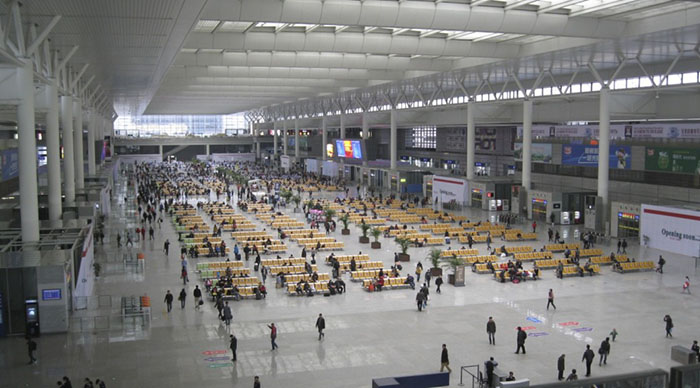By Austin Dean
Chinese high-speed railway stations are overwhelming places, simultaneously cavernous and crowded. The main terminal usually spans one huge space with no divisions or branches. Look up to the ceiling and the station looks empty. But you shouldn’t do that. Down on the ground, there are people everywhere, and you need to pay attention to where you’re going.
Places to eat and shop line the edges of most stations, or fill the basements and second floors. You’re guaranteed to find two establishments: KFC and Starbucks. In China’s major cities, you’re never far away from fried chicken or coffee. In fact, at the Shanghai Hongqiao Railway Station there is a Starbucks on the second floor directly above a Starbucks on the first floor. As comedian Lewis Black once riffed, a Starbucks right next to a Starbucks is a sure sign of the end of the world.
There are also a number of clothing stores whose names don’t seem quite right, especially to people (like me) who don’t know much about fashion. Is Good Luck Gladius supposed to be a rip-off of a foreign brand, or a purely Chinese creation? It requires some research for me to find out it’s the latter.
The most interesting place, in my mind, is the bookstore.
As a general rule, if you’re abroad and can read at least a little bit of the local language, you should always pop into a bookstore when you come across one, regardless of whether it’s on a main thoroughfare or in a railway station. It’s fascinating to see what types of books are prominently displayed, and it increases your chances of having an interesting conversation with a local.
On a recent visit to the small bookstore in the Shanghai Hongqiao Railway Station, the first thing I notice are not books but people: a group of about 12 stare up at a television. Jack Ma, the founder of Chinese internet giant Alibaba, is giving a speech. With deep-set eyes and unrelenting intensity, Ma is a charismatic speaker, and his audience at the small bookstore is hooked. Beneath the television where Ma lectures about the secrets of success are collections of DVDs for sale, all of which feature other people likewise delivering discourses on how to make it big. They might know what they’re talking about — but they also look like hucksters. The box sets are quite clunky, exactly what you don’t want to lug around with you on the train. It doesn’t look like they’re selling well.
More than half of the small store is devoted to books about business, but there are several sub-genres. The first consists of translations of the same books you see in American airport bookstores. The top-ranked book at this outlet is The Willpower Instinct: How Self-Control Works, Why It Matters and What You Can Do to Get More of It. This prompts questions about who is buying this book and why — do travelers on Chinese high-speed trains think they lack self-control? But I realize it’s probably best not to probe this ground too deeply, the publisher likely just paid for the book to be prominently displayed. Another popular title is Zero to One: Notes on Startups, or How to Build the Future by Silicon Valley entrepreneur and investor Peter Thiel. There are also a handful of books about Warren Buffet; the Oracle of Omaha is big in China.
The next set of books focus on similar topics, but are written by professors at top Chinese universities; volumes center on Jack Ma instead of Warren Buffet. One of these, Understanding the Chinese Stock Market, sticks out as quite ambitiously titled. Given everything that’s happened in the Chinese stock market in the past two months, it’s a bold claim and one that’s surely outdated.
The most interesting Chinese business books to me are those that mask themselves as history books. One volume prominently featured in the store is Records of the Relationship between Government and Business in the Late Qing Dynasty. The point of the book is to understand the subtle (weimiao) relations between the government and the business community in historical perspective, with the goal of gaining greater insights into the situation today. This title must have found a wide audience — it is the second of a two-part series.
A number of other biographies cover similar strategies of making the past serve the present. One book promises to deliver the secrets of success from a wealthy entrepreneur in the Ming dynasty, Shen Wansan. Another book about Genghis Khan attributes the Mongol leader’s success to will power (yizhi) instead of wisdom (zhihui). A similar genre exists in America — How to Think Like Steve Jobs — but they don’t usually find inspiration in the 13th century.
Like a Hudson News shop in an American airport, the bookstore in a Chinese railway station is not necessarily the kind of place to find more academic tomes. But China always surprises.
Set between two books about the rise of China, I find a translation of The History of the American People by famed Columbia University historian Charles Beard. The Chinese translation juices up the title a little bit, calling it American History: From the Age of Wilderness to the Age of Imperialism. The Chinese publishers also build up the book’s pedigree: “Translated into over 30 languages” and “Over 100 million copies sold.”
But most of the people in the store weren’t interested in Charles Beard — Jack Ma was still holding forth on the screen.


